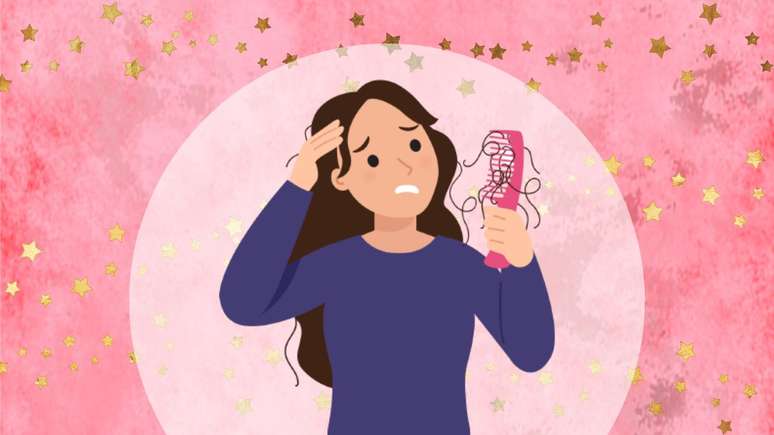A desperate situation is to repair drastic hair loss. Whether it’s in the shower, while combing your hair, or just running your hand through your locks, it’s scary, right? Among the reasons for the sharp decline, stress could be one of them. So, if you’ve been feeling distressed and anxious lately, there’s a good chance it could be the cause of the problem.
On the other hand, the diagnosis goes far beyond recognizing the external cause of the problem. The treatment must also be internal, since stress is linked to hormonal secretion, more precisely to cortisol. In other words, there is a deeper relationship between stress and hair loss. The person who explains it to us here is the doctor and trichologist Doctor Ademir Leite Junior.
“Cortisol is a hormone produced by the adrenal glands. It is part of the group of hormones known as steroids and, like all steroids, its raw material is cholesterol. It is therefore a lipid hormone. It is produced throughout the day, but with peaks of production and secretion into the blood around 8:00 and 16:00,” explains Dr Ademir.
Stress can cause hair to stop growing
In moments of nervousness, excessive tension or feelings of danger, the hormone is released in greater quantities, which can be responsible for numerous symptoms. This is where hormone-related hair loss comes from. The specialist also explains that hair follicles respond to cortisol by reducing the rate of cell proliferation at the root of the hair, which means that hair grows less and may even stop growing.
“Furthermore, it appears that the follicles themselves produce cortisol, a function they perform for self-regulation. In these cases, the hair root cells themselves may reduce their activity or stop working under their own control due to cortisol,” he adds.
Cortisol for health
In addition to hair, excess cortisol for an extended period of time is concerning and can cause several problems. Decreased testosterone, loss of muscle mass, and weight gain are some of them. So is cortisol bad for you? At all!
At normal levels, cortisol has several benefits, such as regulating blood pressure, blood sugar levels, and mood. Furthermore, it also helps maintain carbohydrates, proteins and fats in the body. The hormone also strengthens the heart muscles, being easily related to energy and disposition.
As for hair, for the strands to remain in full production and firm on the scalp, cortisol must play its role. Therefore, it contributes to digestion, the menstrual cycle, weight balance, among other points related to metabolism.
According to the trichologist, “Assessing the level of cortisol during a trichological examination is always important and enlightening, not only to diagnose mild cases of increase in this hormone that can cause hair loss, but also to identify more significant problems from the point of view of the health of the individual as a whole.” So, make an appointment with your dermatologist, okay?
How to treat?
The first and most important recommendation is to seek a specialist to evaluate your body. This helps in understanding the real cause of hair loss. In the case of cortisol, it is essential to keep hormone levels balanced. The problem can only be solved with the dermatologist or with the help of other professionals, such as nutritionists.
Regardless, it is worth remembering that the combination of healthy eating and exercise also applies to cortisol control. This way, an extension of the benefits reaches the brain neurotransmitters, which is very welcome. These are the trio: serotonin, dopamine and endorphins.
With a routine of 20 minutes of daily physical activity, the production of these hormones is already encouraged. So, in addition to providing more energy, this care also reduces the stress that affects the hair, reducing hair loss.
Source: Terra
Ben Stock is a lifestyle journalist and author at Gossipify. He writes about topics such as health, wellness, travel, food and home decor. He provides practical advice and inspiration to improve well-being, keeps readers up to date with latest lifestyle news and trends, known for his engaging writing style, in-depth analysis and unique perspectives.








